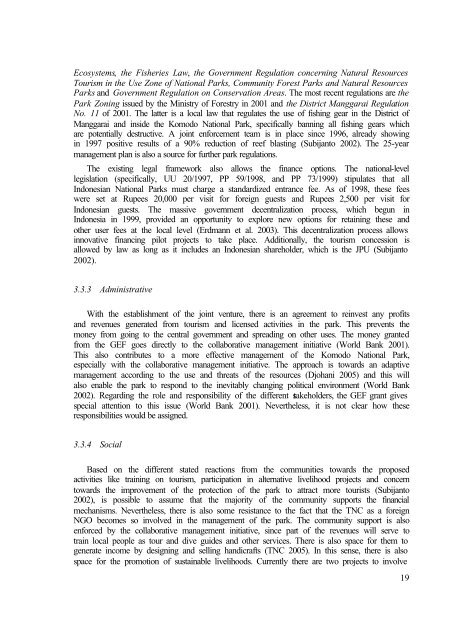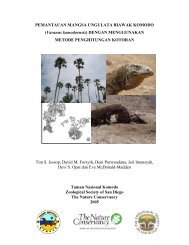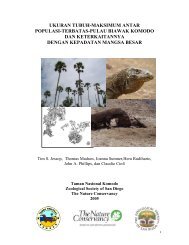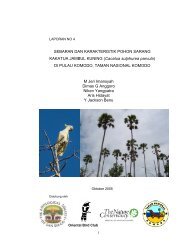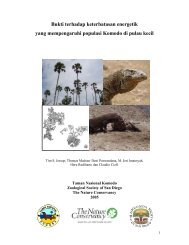Sustainable Financing of MPAs - Komodo National Park
Sustainable Financing of MPAs - Komodo National Park
Sustainable Financing of MPAs - Komodo National Park
Create successful ePaper yourself
Turn your PDF publications into a flip-book with our unique Google optimized e-Paper software.
Ecosystems, the Fisheries Law, the Government Regulation concerning Natural Resources<br />
Tourism in the Use Zone <strong>of</strong> <strong>National</strong> <strong>Park</strong>s, Community Forest <strong>Park</strong>s and Natural Resources<br />
<strong>Park</strong>s and Government Regulation on Conservation Areas. The most recent regulations are the<br />
<strong>Park</strong> Zoning issued by the Ministry <strong>of</strong> Forestry in 2001 and the District Manggarai Regulation<br />
No. 11 <strong>of</strong> 2001. The latter is a local law that regulates the use <strong>of</strong> fishing gear in the District <strong>of</strong><br />
Manggarai and inside the <strong>Komodo</strong> <strong>National</strong> <strong>Park</strong>, specifically banning all fishing gears which<br />
are potentially destructive. A joint enforcement team is in place since 1996, already showing<br />
in 1997 positive results <strong>of</strong> a 90% reduction <strong>of</strong> reef blasting (Subijanto 2002). The 25-year<br />
management plan is also a source for further park regulations.<br />
The existing legal framework also allows the finance options. The national-level<br />
legislation (specifically, UU 20/1997, PP 59/1998, and PP 73/1999) stipulates that all<br />
Indonesian <strong>National</strong> <strong>Park</strong>s must charge a standardized entrance fee. As <strong>of</strong> 1998, these fees<br />
were set at Rupees 20,000 per visit for foreign guests and Rupees 2,500 per visit for<br />
Indonesian guests. The massive government decentralization process, which begun in<br />
Indonesia in 1999, provided an opportunity to explore new options for retaining these and<br />
other user fees at the local level (Erdmann et al. 2003). This decentralization process allows<br />
innovative financing pilot projects to take place. Additionally, the tourism concession is<br />
allowed by law as long as it includes an Indonesian shareholder, which is the JPU (Subijanto<br />
2002).<br />
3.3.3 Administrative<br />
With the establishment <strong>of</strong> the joint venture, there is an agreement to reinvest any pr<strong>of</strong>its<br />
and revenues generated from tourism and licensed activities in the park. This prevents the<br />
money from going to the central government and spreading on other uses. The money granted<br />
from the GEF goes directly to the collaborative management initiative (World Bank 2001).<br />
This also contributes to a more effective management <strong>of</strong> the <strong>Komodo</strong> <strong>National</strong> <strong>Park</strong>,<br />
especially with the collaborative management initiative. The approach is towards an adaptive<br />
management according to the use and threats <strong>of</strong> the resources (Djohani 2005) and this will<br />
also enable the park to respond to the inevitably changing political environment (World Bank<br />
2002). Regarding the role and responsibility <strong>of</strong> the different stakeholders, the GEF grant gives<br />
special attention to this issue (World Bank 2001). Nevertheless, it is not clear how these<br />
responsibilities would be assigned.<br />
3.3.4 Social<br />
Based on the different stated reactions from the communities towards the proposed<br />
activities like training on tourism, participation in alternative livelihood projects and concern<br />
towards the improvement <strong>of</strong> the protection <strong>of</strong> the park to attract more tourists (Subijanto<br />
2002), is possible to assume that the majority <strong>of</strong> the community supports the financial<br />
mechanisms. Nevertheless, there is also some resistance to the fact that the TNC as a foreign<br />
NGO becomes so involved in the management <strong>of</strong> the park. The community support is also<br />
enforced by the collaborative management initiative, since part <strong>of</strong> the revenues will serve to<br />
train local people as tour and dive guides and other services. There is also space for them to<br />
generate income by designing and selling handicrafts (TNC 2005). In this sense, there is also<br />
space for the promotion <strong>of</strong> sustainable livelihoods. Currently there are two projects to involve<br />
19


